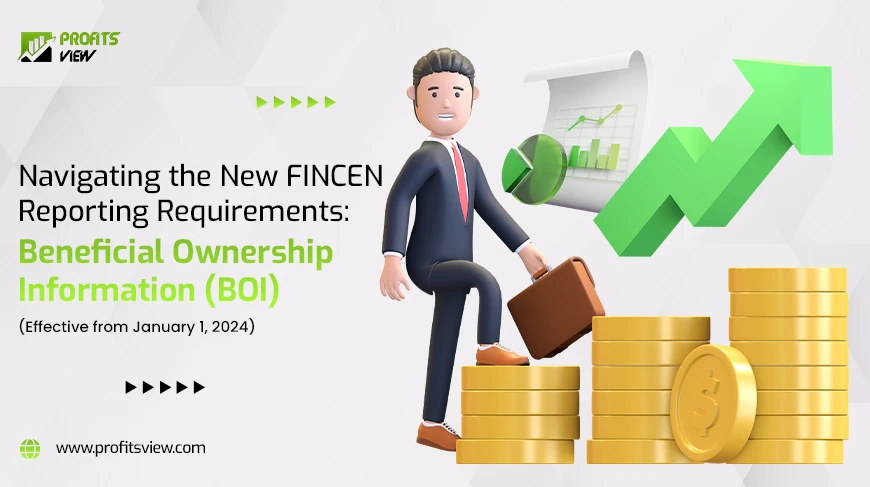The Corporate Transparency Act (CTA) requires “reporting companies” to file a report with the Department of Treasury’s Financial Crimes Enforcement Network (FinCEN) containing, among other things, personal identifying information about the company’s beneficial owners. The information collected will be kept in a private database maintained by FinCEN with access limited to authorized government authorities and in certain circumstances, financial institutions.
It is crucial for businesses to stay compliant with regulations, and a significant change is on the horizon. The Corporate Transparency Act, which was passed in 2021, introduces new ownership information reporting requirements for businesses in the US, which will be effective from January 1, 2024.
This new regulation is aimed at promoting transparency and combating financial crimes. Certain entities must report their Beneficial Ownership Information to the Financial Crimes Enforcement Network (FinCEN) and the federal government. Let’s take a closer look at what this means for your business.
What Is Beneficial Ownership?
Beneficial ownership is a concept used to determine who has substantial control over a company, often beyond the normal scope of ownership.
A beneficial owner can be identified as any person, including family members, who directly or indirectly exercise substantial influence over the activities and decisions of an entity but does not necessarily show up on paper as a formal title holder like CEO or President.
Any individual with over 25% or potentially controlling over 50% of ownership interests in a business might be considered an owner.
Other measures can be used to determine beneficial ownership, such as having one’s name listed as holding beneficial rights on legal documents or being the sole signatory of documentation for finances.
Who Needs to Report Beneficial Ownership Information (BOI)?
You might need to file a report if you operate a domestic or foreign entity, limited liability company (LLC), or a similar legal entity in the US. The law specifically targets “Reporting Companies” – legal entities formed or registered in any US state through official channels. However, FinCEN has outlined 23 exempt entities, including large operating companies, tax-exempt entities, and inactive entities.
Identifying Beneficial Owners
A crucial part of the ownership information reporting process is identifying the “Beneficial Owners” of your company. These individuals either own or control at least 25% of the company’s ownership interests or have substantial control over the company, even if they don’t hold a 25% stake.

What Information Will You have to report to FinCEN?
Reporting company owners must comply with the Bank Secrecy Act (BSA). This requires providing FinCEN with details about their business, including its legal name, any DBAs used, location of formation, and taxpayer identification number.
In addition to this information, beneficial owners must provide personally identifiable information. Beneficial owners are individuals who control or hold at least 25% of the company’s ownership. FinCEN requires that each beneficial owner provide a legal name, birthdate, home address, identifying number from a passport or driver’s license, and an image of the document associated with that number.
Companies formed after January 1st, 2024, must submit additional information about their applicants. It is important that businesses accurately report this data, as failure to do so could result in costly fines or legal action against you or your company.
- For the company: Full legal name, DBA name, business street address, jurisdiction of formation, and Taxpayer Identification Number (TIN).
- For each Beneficial Owner: Full legal name, date of birth, residential address, and a unique identifying number.
What are the consequences if the information I reported changes or if I discover it was inaccurate when the report was filed?
If you report inaccurate information or your business information changes due to events such as an increase in beneficial owners or a modification to the registry, you must update the Beneficial Ownership Information (BOI) report within 30 days of becoming aware.
The new report should include detailed and accurate information on the current beneficial owners and any changes that occurred since the previous report. It is important to note that intentionally filing false or inaccurate reports with FinCEN can be subject to criminal penalties under federal law, so take care to submit only accurate and up-to-date information about your business.
How Will the Information Be Used
The personal and company information you provide will be used by federal agencies involved in national security, intelligence, or law enforcement, as well as by state and local law enforcement agencies under certain conditions, like if a court has authorized the agency to seek the information in a criminal or civil investigation.
How and When to File
Filing will be done electronically through FinCEN’s website using a secure system that will be available starting January 1, 2024. The filing deadlines vary:
- Companies existing before January 1, 2024, have until January 1, 2025.
- New companies formed on or after January 1, 2024, will have a 30-day deadline (or 90 days under a recent proposal) to file after being officially recognized.
Consequences of Non-Compliance
Failure to meet the regulatory requirements or unauthorized disclosure of Beneficial Ownership Information can result in civil or criminal actions and potential penalties.
Willful failure to file a complete initial or updated report with FinCEN is subject to a US$500-per-day fine (up to US$10,000) and imprisonment for up to two years. An individual who knowingly discloses BOI, without authorization is subject to a US$500-per-day penalty (up to US$250,000) and up to five years’ imprisonment.

Review FinCEN’s Small Entity Compliance Guide
The Small Entity Compliance Guide was published by FinCEN, providing comprehensive guidance on compliance obligations under the beneficial ownership information reporting rule.
Frequently Asked Questions
1. What is a “reporting company”?
A domestic reporting company is defined as any entity that is a corporation, a limited liability company, or is created by the filing of a document with a Secretary of State or similar office under the law of a state or Indian tribe.
A foreign reporting company is defined as any entity that is a corporation, a limited liability company, or other entity formed under the law of a foreign country and registered to do business in any state or tribal jurisdiction by the filing of a document with a Secretary of State or similar office under the law of a state or Indian tribe.
2. What entities are exempt from the definition of “reporting company” and therefore do not have to file a BOI report?
There are 23 exemptions. Most are for companies that are already subject to substantial federal or state regulation under which their beneficial ownership may already be known. This includes, among others, entities that file reports with the SEC, governmental authorities, banks, credit unions, money services businesses, investment advisors, securities brokers and dealers, tax-exempt entities, entities assisting tax-exempt entities, insurance companies, state-licensed insurance producers, pooled investment vehicles, public utilities, inactive entities, subsidiaries of certain exempt entities, accounting firms, and large operating companies.
3. What is a “large operating company”?
The exemption for a “large operating company” is available to any entity that (1) employs more than 20 full time employees in the United States, (2) has an operating presence at a physical office within the United States, and (3) has filed a federal income tax or information return in the United States for the previous year demonstrating more than $5 million in gross receipts or sales on the entity’s IRS Form 1120 or other applicable IRS form, excluding gross receipts or sales from sources outside the United States, as determined under Federal income tax principles.
The term “has an operating presence at a physical office within the United States” means that an entity regularly conducts its business at a physical location in the United States that the entity owns or leases and that is physically distinct from the place of business of any other unaffiliated entity.
4. What is a FinCEN identifier, how is it obtained, and how is it used?
A FinCEN identifier is a unique number issued by FinCEN to individuals and reporting companies. Each FinCEN identifier is specific to the individual or company and only one FinCEN identifier can be obtained.
An individual may submit an application for a FinCEN identifier that contains all of the information that otherwise has to be set forth in the initial report about that individual. An individual who has obtained a FinCEN identifier may provide it to the reporting company and the reporting company can include the FinCEN identifier in lieu of the information otherwise required.
A reporting company may obtain a FinCEN identifier by submitting to FinCEN an application at or after the time that the entity submits an initial report. A reporting company may report another entity’s FinCEN Identifier and full legal name in lieu of the information required with respect to the beneficial owners of the reporting company only if:
- The other entity has obtained a FinCEN Identifier and provided that FinCEN Identifier to the reporting company.
- An individual is or may be a beneficial owner of the reporting company by virtue of an interest in the reporting company that the individual holds through an ownership interest in the other entity; and
- The beneficial owners of the other entity and of the reporting company are the same individuals.
If there is any change with respect to required information previously submitted by an individual to FinCEN in the application for the FinCEN identifier, the individual must file an updated application reflecting the change within 30 calendar days after the date on which the change occurs. If the application was inaccurate when filed and remains inaccurate, the individual must file a corrected application within 30 calendar days after the date on which the individual becomes aware or has reason to know of the inaccuracy. Any reporting company that has obtained a FinCEN identifier is required to file an updated or corrected report to update or correct any information previously submitted to FinCEN at the same time and in the same manner as updated or corrected BOI reports.
5. Who is responsible for filing the report and making the certification?
FinCEN states that while an individual may file a report on behalf of a reporting company, the reporting company is ultimately responsible for the filing. The same is true of the certification. The reporting company will be required to make the certification, and any individual who files the report as an agent of the reporting company will certify on the reporting company’s behalf.
Conclusion
The new FinCEN reporting requirements are a significant development for businesses operating in the US. It’s crucial to start assessing which of your entities need to report and who their Beneficial Owners are. Consider gathering the necessary information in advance to ensure compliance.
If you’d like support in reviewing the new requirements, contact our Tax Experts at Profits View Inc.!
The September 2022 final rule and November 2023 amendment may be accessed here.
https://www.fincen.gov/sites/default/files/shared/31_CFR_1010_380_excerpt_from_Final_Rule.pdf
https://www.govinfo.gov/content/pkg/FR-2023-11-08/pdf/2023-24559.pdf

